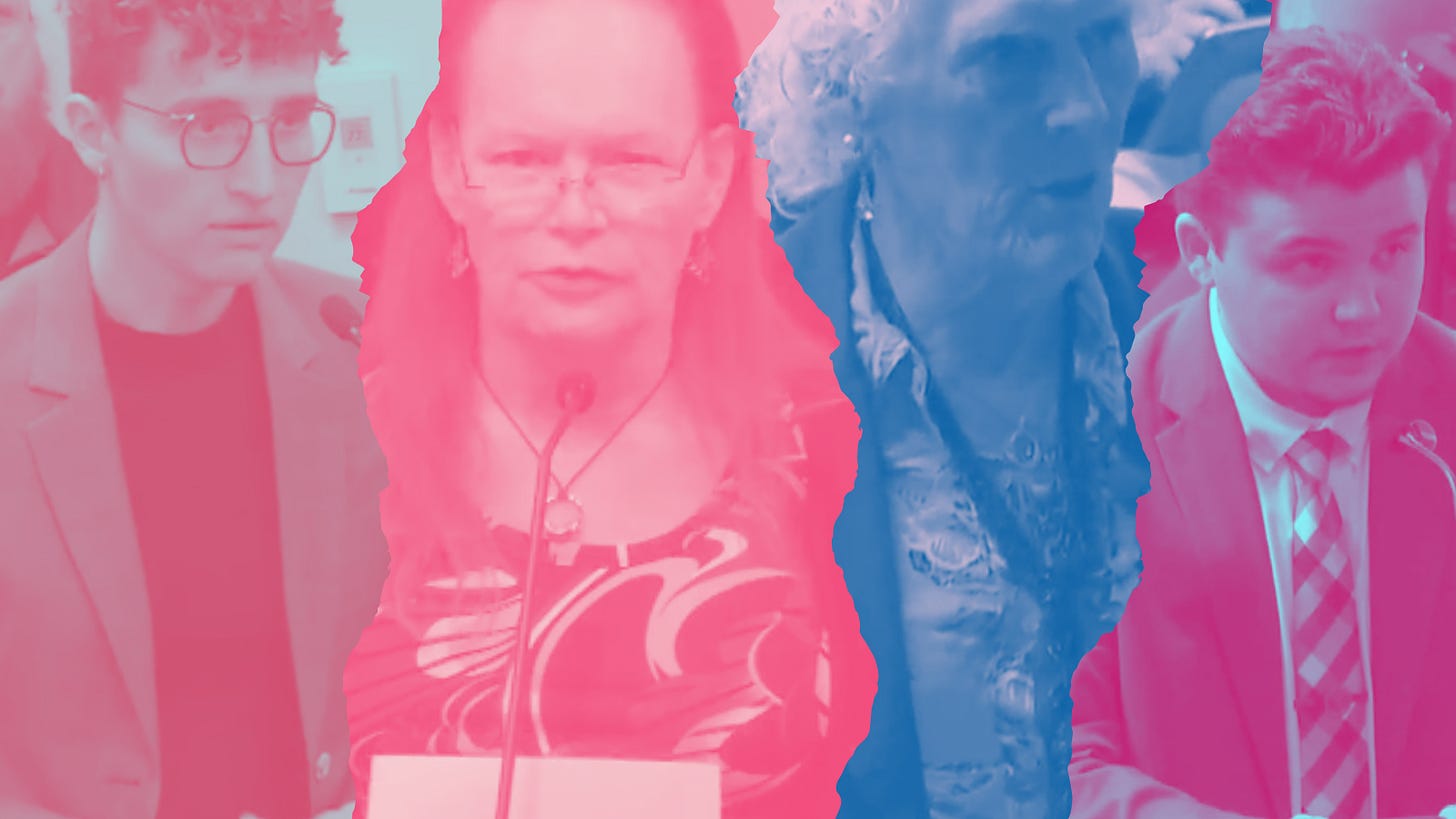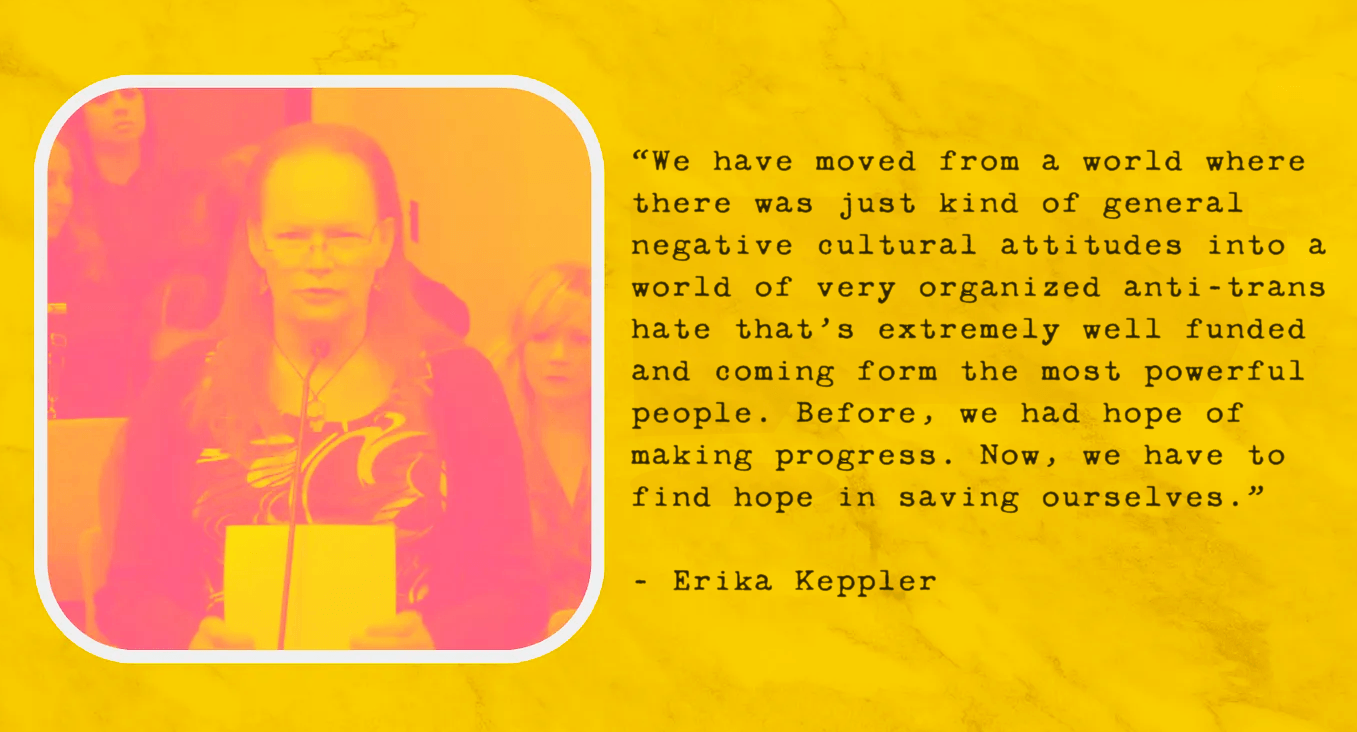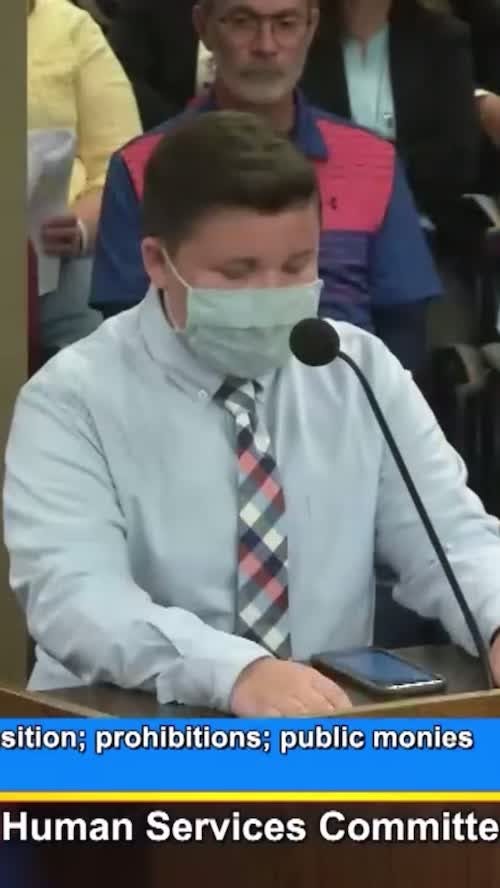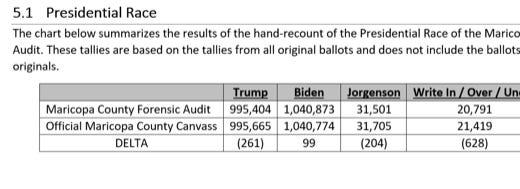
Some LGBTQ+ Arizonans are avoiding the Capitol for safety
Advocates are advising families of queer youth to stop showing up at the Capitol for fear of being sought out and investigated, while others continue to have their voices heard in hearings.
Erica Keppler is going through her possessions and figuring out what she can sell. Moving out of the country is expensive, and she can’t bring everything she’s amassed in the 26 years she’s lived in her Phoenix home.
Keppler is also trying to find time to learn Spanish, in case that's the language spoken in the country she needs to flee to.
For now, Keppler’s continuing her advocacy against anti-transgender bills at Arizona’s Legislature, watchdogging the legislative action on behalf of her community, a practice she has mastered throughout her retirement.
But as a transgender woman keenly aware of the transphobia dominating the country’s executive branch and seeping into the state Legislature, Keppler knows she might not be safe in the United States for much longer.

More than ten years ago, Keppler first went to the state Capitol to testify against one of Republican Sen. John Kavanagh's “bathroom bills” that would force students to use gendered bathrooms based on their sex assigned at birth.
That was in 2013, before President Donald Trump’s first presidency and the onslaught of anti-transgender measures that have come with a second one. A lot has changed since then, and so has Keppler’s approach to advocating at the Capitol.
“We have moved from a world where there was just kind of general negative cultural attitudes, into a world of very organized anti-trans hate that's extremely well funded and coming from the most powerful people,” Keppler said. “Before, we had hope of making progress. Now, we have to find hope in saving ourselves.”
The shift into a second Trump presidency has changed the way transgender rights advocates advocate at the state Capitol. The stakes have become much higher, especially for queer people and their families who go to the Capitol to testify.
The vitriol transgender people face from their Republican lawmakers and their online supporters — and the general inability to break through ideological anti-trans talking points — has forced many trans activists to reconsider whether their efforts are worth the time, energy and mental anguish that goes along with participating in public life as a trans person.
When Keppler first came to Arizona’s Capitol to testify against Kavanagh’s 2013 bathroom bill, she said more than 200 people showed up to speak out against the bill.
This year, the rooms have been even emptier. In the past, queer people and their families have made their way to the Capitol to face the lawmakers proposing legislation that would fundamentally alter their lives. Now, they’re not.
Their fear is not without good reason: On his first day in office, Trump issued an executive order declaring the government would only recognize female and male genders. His administration removed references to transgender people on government websites and directed the federal Bureau of Prisons to house transgender women based on their sex at birth.
Both of those orders are currently being challenged in court, but it’s just a small portion of the president’s anti-trans agenda.
Trump declared that gender markers issued on all new passports have to be based on one’s sex assigned at birth, and the “X” gender marker that intersex, nonbinary and transgender people often use is no longer an option.
The president declared transgender people can’t serve in the military.
Medical providers that provide gender-affirming care to people under 19 can’t get federal funding, and many have stopped giving that care to transgender youth altogether, despite a court ruling putting the order on pause.
And Arizona’s Republicans have been busy trying to strip away transgender rights in Arizona.
Kavanagh has resurrected the bathroom bills he’s run for years to determine which locker rooms transgender students can use and define which pronouns students can be called.
Republican Sen. Janae Shamp is running a bill to punish healthcare providers who perform gender transition procedures on minors, which she called “extreme physical butchering.”
Republican Rep. Lisa Fink — a new lawmaker with ties to Christian nationalists — created a bill requiring the state to identify every person as either male or female while creating distinct, separate spaces for both genders in places like locker rooms and domestic violence shelters.
The message from the Trump administration and its loyalists is unequivocal: Transgender people aren’t welcome in the United States.
So instead of going toe-to-toe with lawmakers, advocates are taking a different approach: let allies do the talking and keep the kids away from lawmakers who might attack them.
“In past legislative sessions, we have packed the room to show support for the folks that are testifying and show support for the [LGBTQ+] community,” said Bridget Sharpe, Arizona State Director for the Human Rights Campaign. “This session feels different because there's a lot of fear coming from, obviously, the Trump administration, with all of the executive orders that have come down specific to trans kids.”
After Trump signed the “Protecting Children From Chemical And Surgical Mutilation” executive order aimed at ending gender-affirming care for youth under 19 years old, one organizer in Southern Arizona — who spoke to LOOKOUT and Arizona Agenda on the condition of anonymity — advised trans youth and their guardians to refrain from testifying at the Capitol until legal advocates acted to file an injunction at the national level.
Trump’s directive was packed with misinformation on trans people and, while not law, advocates for using government power to investigate people who provide gender-affirming care, including parents.
Parents are worried that if they come to speak up for their children’s rights, it’ll be easier for lawmakers who align with Trump to seek them out and start investigations against them. It’s not a made-up fear: Texas Governor Greg Abbott, for example, did something similar in 2022.
Conservative Litmus Test
Since she took office in 2023, Democratic Gov. Katie Hobbs has reliably vetoed any anti-LGBTQ+ bills that made it out of the Legislature. In last year’s veto of Kavanagh’s bathroom bill, Hobbs said she won’t “sign legislation that attacks Arizonans.”
While a Democrat occupies the executive tower, advocates like lobbyist Jeanne Woodbury know the impact of veto-bait bills restricting transgender rights isn’t realized in them actually becoming law. But when people see how their lawmakers, and the president of the United States, talk about transgender people, they’re given agency to copy those talking points.
“These bills create a narrative, and people repeat that narrative. If you can stop the spread of it, I think that can reduce the impact,” said Woodbury, who is also a transgender woman.
Those political motivations mean there’s little chance of actually changing a Republican lawmaker’s mind. And Keppler acknowledges “there's probably really good reasons to maybe not be fighting it at this point of time, under these circumstances.”
Last year, after Hobbs vetoed three different attacks on transgender rights, Republican lawmakers sought to sidestep her by sending a “bathroom bill” to the ballot. But after intense lobbying from trans rights activists, then-Republican Sen. Ken Bennett voted against the referral, killing it. He teared up while explaining to the Senate Education Committee that the bill would also affect some of his nieces and nephews.
Bennett lost his 2024 primary election to far-right former lawmaker Mark Finchem. And Republican lawmakers expanded their margins in the state House and Senate, meaning it would take more than just one Republican defector to kill a bill these days.
Parents of trans youth said that each family may need to advocate in whatever way is safest for them, given the current social wars focused on Black and brown communities, immigrants and queer people.
Those who choose to show up at the Capitol know it’s a gamble — not just for their safety, but also for their children’s well-being.
Tami Staas is a Mesa public school teacher and the executive director of Arizona Trans Youth Parent Organization. Her local group offers legal, medical and social guidance to parents of gender-diverse youth.
“Every time these kids are showing up at the Capitol, they're missing out on learning,” Staas said. “They're missing out on school. They're missing out on the day with their friends to do that, and what they encounter when they miss out on that is some horrific things.”
Staas said trans and nonbinary folks who testify often encounter misgendering, protests and counter-testimony rooted in arguments that deny their existence.
“It takes a great toll on their mental health, and a lot of times to no avail. These bills end up passing out of committee … The kids are tired of being beat up by the bullies in the Legislature.”
Fight and flight
Parents of trans youth and their allies told LOOKOUT and Arizona Agenda that extensive work goes into preparing families to testify; not just around traveling, but also educating parents who want to testify on laws, on how to speak and answer questions when testifying and what the state’s process is for a bill to become law.
Lizette Trujillo, a small business owner in Tucson and community advocate for trans youth and their families, has closed her business several times in the past and taken her son out of school for the day to drive up to the Capitol in Phoenix. Because legislative hearings occur during the week, making the trip to testify also requires access to a vehicle and money for gas, or an organized carpool.
“It's really frustrating to hear or to continuously have legislators use our tax dollars and then disrupt our day-to-day lives with bills that only target a small population — and they target children,” Trujillo said.
For the past seven years, Trujillo has run a trans-parent organization of around 300 families, she estimated. The group started as a way for people to connect about experiences they had in schools or public places, including violent threats.
Similar threats have become more frequent across the nation and state, with parents in Arizona wanting to see change, but now having to hedge their bets (and their family's safety) on attending legislative hearings.
“It's been really important for us to think about the safety of our families, especially at this moment — but also to continue to strategically do the work of trying to stop bills so that, in the next two to four years, our children are not worse off,” Trujillo said. “We have to continue to advocate and fight for them.”
Samual Kahrs, a 19-year-old transgender man, is part of the main group of transgender testifiers that continue to show up at the Capitol. Since 2022, he’s spoken out against bills limiting gender-affirming care for minors and regulating pronouns. For most of that time, he was young enough that the bills would have affected him directly.
But he admits every time he waits to be called up to the podium, he’s shaking from nervousness. Kahrs knows that most of the time, the Republican-dominated committee will vote against his pleas.
He made his last hour-long drive from San Tan Valley to the Capitol on January 29. He has now moved to England — a benefit he could afford as a dual citizen — and announced his departure at the Capitol:
“For many of you, you will look purely at the facts of this bill and will have no emotional tie to the effects it will have on the youth that it targets. Let me be your emotional tie…” he told lawmakers who advanced a bill requiring parental permission for students to use their preferred pronouns. “I should be attending my dream university right now, but instead, I am packing as much of my life as I can into three suitcases because I have to flee the only country I've ever lived in due to fear for my life.”
 Tiktok failed to load.
Tiktok failed to load.Enable 3rd party cookies or use another browser
Keep showing up—in different ways
The bills advancing through the state Legislature impact how all transgender people are treated. But Arizona’s transgender community is not running.
Paul Bixler, the first transgender woman to hold elected office in Arizona, didn’t transition until 2018, even though she’s “known forever, since (she) was a little tiny child, that (she) was different.”
There’s a demographic shift unfolding where those with gender dysphoria can access care at younger ages than Bixler was able to. She went through affirmation surgery in 2022 but said trying to pass as a woman isn’t her priority. Being able to live her life as one is.
Bixler was elected to the Liberty Elementary School District Governing Board in 2020 — she’s spent her life as a public school professional. But the combination of being a transgender woman and presiding over an elementary school district was a hotbed for hostility.
She was subjected to a mass harassment campaign championed by “The Patriot Barbie” podcast host Lindsey Graham, who showed up to many school board meetings disparaging Bixler, once with a performative demonstration that just because she’s dressed as a cat doesn’t mean she is one. That landed her air time on Fox News.
Bixler’s neighbors received letters calling her a groomer, the Patriot Barbie called the police on her for using the women’s locker room at the gym and speakers demanded her resignation while running an unsuccessful recall campaign.
Despite that nightmare, she ran for reelection last year. Bixler has a similar philosophy to the top-voter-getter in that race does, but came in last.
“There's really only one conclusion I could draw. The only reason why I was not re-elected was because I was transgender,” she said. “That hurt me to my core.”
In 2022, Bixler started going to the Capitol to speak against anti-transgender bills. While the torrent of hatred she received was localized to a school board, Bixler decided to speak publicly at the state Capitol for one reason: “They were hurting kids.”
She told the committee hearing Kavanagh's pronoun bill this year: “What are you afraid of? … There is no need or desire to have this legislation. It is a terrible solution to a problem that does not exist.”
Bixler said she’s been listened to at the Legislature, but she hasn’t really been heard.
She plans to keep showing up.
“I think the worst thing we could do at this point is to become invisible again,” she said.


















Thank all of you for your honesty and your courage. I too have showed up at the capitol as an advocate for public schools and found legislative bullies intimidating and rock solid in their bigotry.
Keep the faith and make change where change is possible.
Patricia Price
This is heartbreaking but a completely understandable reaction. Allies: now is the moment to kick up our activism. Show our brothers/sisters/siblings how much they mean to us 💜